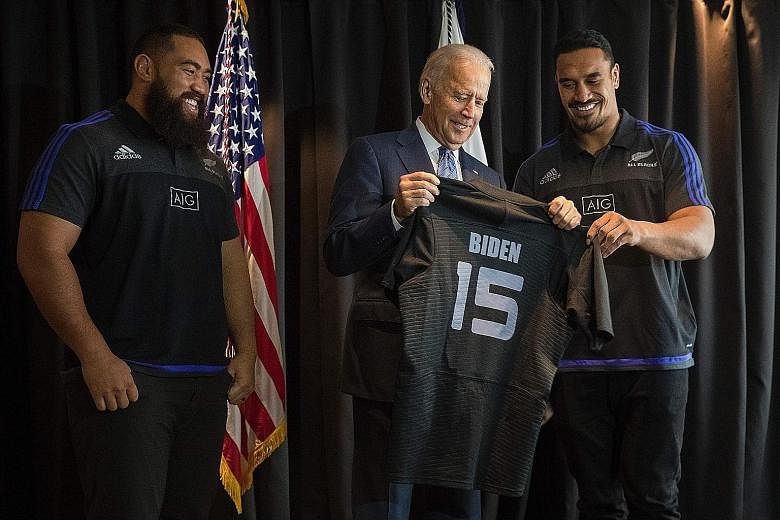AUCKLAND • The United States ended a three-decade stand-off with New Zealand yesterday when Vice- President Joe Biden announced an American warship will visit Auckland later this year.
No US naval ship has docked in New Zealand since a row over nuclear weapons erupted in the 1980s and Mr Biden said the symbolic visit was "a major step to further friendship" between the two nations.
"It is with great pleasure and honour that the United States gladly accepts the invitation to send a ship to the Royal New Zealand Navy's 75th (anniversary) celebration this November," he told reporters. "It will be yet another expression of our close and cooperative relationship."
New Zealand and the US were strong allies during World War II, but ties soured when the South Pacific nation declared itself nuclear- free in the 1980s.
It banned nuclear-powered warships and those carrying atomic weapons from its waters in 1986, creating a dilemma for Washington, which has a policy of neither confirming nor denying its vessels' nuclear capability.
The US responded by suspending the three-way Anzus defence treaty - which also involved Australia - and placing strict controls on military cooperation.
New Zealand Prime Minister John Key said Wellington and Washington had found a way to work around the issue, while still respecting each other's position.
"It's not a victory for one side or a defeat for another, it's a sense that our relationship is more important (than this)," he told reporters.
Mr Key said the US had not been asked to drop its policy of refusing to declare its ships' nuclear capability.
Instead, the New Zealand leader said he simply had to be satisfied, based on advice from his officials, that any visiting ship was nuclear-free.
Today, such information about US Navy vessels is freely available, and the US is more concerned with growing its presence in the Pacific as China extends its influence in the region, said Mr Paul Buchanan, a security analyst at 36th Parallel Assessments.
Activists have already pledged to disrupt the November visit, with a group called Auckland Peace Action saying it will send a "peace flotilla" to meet the US navy.
"Warships have no place in our peaceful country," spokeswoman Valerie Morse said. "We can't stand by while weapons profiteers promote war in our beautiful city."
After the Cold War-era row, relations between Washington and Wellington began to thaw when New Zealand contributed troops to the US-led mission in Afghanistan.
The-then secretary of state Hillary Clinton visited Wellington in 2010 and the countries signed a defence cooperation accord two years later.
Mr Biden returned to the US yesterday, wrapping up a trip that also included Australia.
While in Auckland, he received a traditional Maori welcome from club-wielding, tattooed warriors on the lawn of Government House.
He also met members of New Zealand's world champion rugby team, joking, "Put me in, coach, I'm ready to play," after receiving an All Blacks jersey bearing his name.
AGENCE FRANCE-PRESSE, BLOOMBERG

